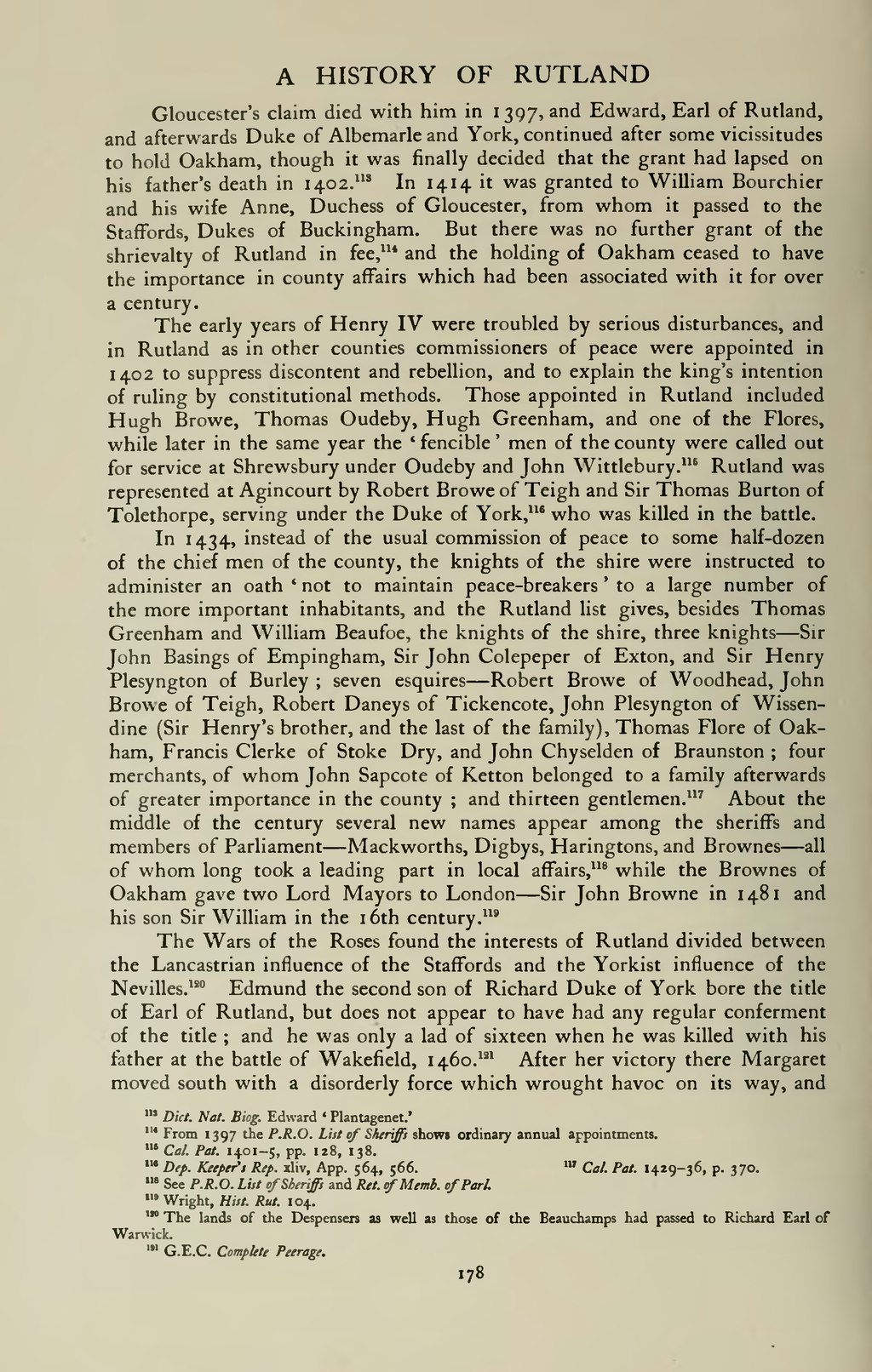A HISTORY OF RUTLAND Gloucester's claim died with him in 1397, and Edward, Earl of Rutland, and afterwards Duke of Albemarle and York, continued after some vicissitudes to hold Oakham, though it was finally decided that the grant had lapsed on his father's death in 1402.^" In 1414 it was granted to William Bourchier and his wife Anne, Duchess of Gloucester, from whom it passed to the StafFords, Dukes of Buckingham, But there was no further grant of the shrievalty of Rutland in fee,"* and the holding of Oakham ceased to have the importance in county affairs which had been associated with it for over a century. The early years of Henry IV were troubled by serious disturbances, and in Rutland as in other counties commissioners of peace were appointed in 1402 to suppress discontent and rebellion, and to explain the king's intention of ruling by constitutional methods. Those appointed in Rutland included Hugh Browe, Thomas Oudeby, Hugh Greenham, and one of the Flores, while later in the same year the ' fencible ' men of the county were called out for service at Shrewsbury under Oudeby and John Wittlebury."* Rutland was represented at Agincourt by Robert Browe of Teigh and Sir Thomas Burton of Tolethorpe, serving under the Duke of York,"' who was killed in the battle. In 1434, instead of the usual commission of peace to some half-dozen of the chief men of the county, the knights of the shire were instructed to administer an oath ' not to maintain peace-breakers ' to a large number of the more important inhabitants, and the Rutland list gives, besides Thomas Greenham and William Beaufoe, the knights of the shire, three knights — Sir John Basings of Empingham, Sir John Colepeper of Exton, and Sir Henry Plesyngton of Burley ; seven esquires — Robert Browe of Woodhead, John Browe of Teigh, Robert Daneys of Tickencote, John Plesyngton of Wissen- dine (Sir Henry's brother, and the last of the family), Thomas Flore of Oak- ham, Francis Gierke of Stoke Dry, and John Chyselden of Braunston ; four merchants, of whom John Sapcote of Ketton belonged to a family afterwards of greater importance in the county ; and thirteen gentlemen."^ About the middle of the century several new names appear among the sheriffs and members of Parliament — Mackworths, Digbys, Haringtons, and Brownes — all of whom long took a leading part in local affairs,"* while the Brownes of Oakham gave two Lord Mayors to London — Sir John Browne in 1481 and his son Sir William in the i6th century."' The Wars of the Roses found the interests of Rutland divided between the Lancastrian influence of the Staffords and the Yorkist influence of the Nevilles.^*" Edmund the second son of Richard Duke of York bore the title of Earl of Rutland, but does not appear to have had any regular conferment of the title ; and he was only a lad of sixteen when he was killed with his father at the battle of Wakefield, 1460.*" After her victory there Margaret moved south with a disorderly force which wrought havoc on its way, and "' Diet. Nat. Biog. Edward ' Plantagenet.' "* From 1397 the P.R.O. List of Sheriffs shows ordinary annual appointments. '" Cal. Pat. 1401-5, pp. 128, 138. '" Dep. Keeper's Rep. xliv, App. 564, 566. "' Cal. Pat. 1429-36, p. 370. "» See P.R.O. List of Sheriffs and Ret. ofMemb. of Pari '" Wright, Hist. Rut. 104. "° The lands of the Despensers as well as those of the Beauchamps had passed to Richard Earl of Warwick. '" G.E.C. Complete Peerage. 178
